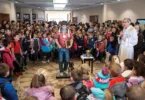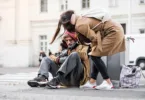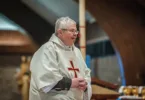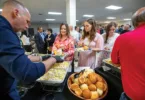Catholic Relief Service’s Dr. Carolyn Woo sits down with The Leaven to talk about the refugee crisis that has seen 60 million people displaced
by Moira Cullings
moira.cullings@theleaven.org
Q. A few weeks ago, a single image of Aylan Kurdi, a drowned Syrian boy on the beach, came to crystallize the world’s refugee crisis. Why has it taken so long, do you think, to get the world’s attention on this issue?
A. Why does it take so long? I think because the problem is so complex — and the solutions are very difficult — that people pass on really taking it up. And it is not enough that one country, for example, takes it up; this is a multi-country coordination, planning. So I think that, until it really hits hard, we’ve been postponing it.
Q. What is the scope of the problem? We often hear the phrase “not since World War II have there been this many,” but what does that mean in terms of numbers of individuals, countries and continents in turmoil?
A. It is true this is the biggest refugee crisis since World War II. There are 60 million people who have been displaced. That is about the size of Italy. . . . Of those 60 million, about 20 million are crossing borders, which is what you see with the migrants going from Syria into Europe — these are refugees.
There are another 38 million or so who are internally displaced. And what that means is that, like in Ukraine, when Eastern Ukraine experienced the conflict with Russia and the eastern part of the country — the disagreement and the fighting — [many] moved to the west. It’s no less traumatic, because you cannot take your jobs with you, you cannot take your homes with you.
Sometimes, you have no access even to your savings account. People who are on pensions have no access to pensions. They move from the east of the country to the west, which might as well be a completely different culture.
So, 60 million — that’s a very large number. That is like one out of six people in the United States.
Q. We often hear the Syrian flight attributed to the Assad regime’s war against its own people and the rise of ISIS. What are some of the other factors that have led to this unprecedented dislocation?
A. Actually, the Middle East displacement is the result of different things. Clearly, the whole Syrian breakdown, the internal conflict which then gave place to many different factions, many different rebel groups fighting for power, [are among the causes]. We also see ISIS, for example, displacing people when they occupy whole cities.
There is also displacement in other parts of the world. In Central America, you have the whole issue of violence in Colombia, a civil conflict which has put a lot of people at harm. They are moving, too. A year ago, we saw people moving into the United States from Central America. And that’s driven by poverty, that’s driven by gang violence, that’s driven by broken families where children are looking for their parents in the United States.
And I would say this round of huge displacements is due to unbelievable bloodshed and the type of insecurity that you would not put your children through. So usually violence and extreme poverty are the drivers of this type of movement.
Q. Pope Francis has clearly called for Christians to view the refugee problem as something we are obliged to respond to. How do you interpret his message?
A.That we are all one family. This is not something happening to “them” — this is happening to all of us. I think that the picture of Aylan Kurdi (the little boy on the beach) all of a sudden made the situation one that we can identify with. . . . We all know what it means to take the type of risk that puts your children at risk, on a journey which has so many perils, where one of the outcomes could clearly be death.
[Seeing that picture made us recognize that] we know that this is unacceptable, we know that this is not what we want for ourselves and this is not what we want for our children — and so, let’s every one of us step up. Because, in the end, these are not strangers to us. These are brothers and sisters in God’s family.Q. What did you think of Pope Francis’ recent instruction to European parish and religious orders to each take in two refugee families themselves, and the fact that the Vatican is taking in two itself?
A. I think that’s wonderful. It’s very practical advice, very feasible, very doable. It allows each of us to play a role in resolving this crisis. I would say actually, because of his urging, we also see more governments step up.
Q. Most of us in the United States are not even going to be in a position to take in a refugee. But through CRS, Americans can help refugees in all parts of the world. So could you start by explaining what CRS is, how long it has been in operation and the scope of its work?
A. Refugees are very much an integral part of [CRS’] history. We were founded by the bishops’ conference of the United States in 1943 to take refugees out of Eastern Europe in World War II. That’s how we were born — to serve refugees and to take them out of really difficult situations.
And so today, we operate in 103 countries. We serve about 85-100 million people every year. Our service is comprehensive. Part of our emergency work is to respond to natural disasters as well as man-made disasters. So, this type of massive suffering and movement of people, we have experience of that, we have dealt with that in the last 70 years.
Q. What advantage does being an agency of the Catholic Church provide you?
A. Well, we work in the name of the Catholic Church to bring the Gospel message of God’s love everywhere. That is our touchstone. And I would say whether people are Catholic or not Catholic — Christian or not Christian — they understand that motivation.
And with the long history that we have of working in these places, they trust that that is truly our touchstone.
And, of course, everywhere we go in the world, pretty much, we have our Catholic sister agencies. We have the Caritas agencies in many different countries. We have Caritas Iraq, for example. There is Caritas Syria. There’s Caritas Albania. So, in places that people don’t think about [CRS], we actually have this family. This is a family of charitable services done in the name of the Gospel around the world. We connect with our Caritas brothers and sisters; we synergize; we build each other’s capacity; we lean on the local agencies to help us understand what is the right approach, what are their needs. . . . Being part of a global family is just a wonderful sense of solidarity, a wonderful sense of joint capability and a common touchstone: believing in the love of God.
Q. What are the biggest challenges Catholic Relief Services faces regarding the refugee situation?
A. Oh, I think the problem is so big, it overwhelms. And so, the idea is to always focus on what we can do, rather than focus on what we cannot do.
Q. What can people in the United States do to offer their own aid to refugees overseas?
A: Oh, many different ways. Clearly, of course, this particular crisis right now requires a lot of resources. I think assistance to people in host countries, particularly through the whole Caritas network [is needed] because the Caritas network in these different countries is working very hard to meet both the short-term and longer-term needs of these refugees.
And I think prayer is always important.
But the third way is to participate in the advocacy to our own U.S. government, on multiple dimensions. And that is for the U.S. government to also release the type of resources that are necessary. I mean, in a lot of places now, there are no health services or medications available because funding has been reduced. The World Food Programme will tell you that they are running out of resources just to feed people.
So, one of the advocacies is for the U.S. government to release the type of funding necessary to support this.
Also, I think that Americans generally do not know the Syrian cultures or the Iraqi cultures, so I think [seeking out] more of a broad-based education so that we don’t just get fearful of people, based on some perceptions that we have.
I think that we, as Catholics, we in different parishes, can actually facilitate [that] type of conversation and dialogue and getting to know and being hospitable to new immigrants. I think that’s very important work to do.
Q. How about refugees a little closer to home, like those being resettled into our communities, through agencies such as Catholic Charities of Northeast Kansas?
A. I think my comment to the last question particularly applies to that, and that is to not think about these newly settled refugees as really strange people. It is “they,” and “they” have strange practices, and are “they” dangerous to us?
All of these, I think, sometimes are natural when you don’t have engagement with “the other.” So, particularly in parishes, welcoming new immigrants, [there is a need for] a real genuine desire to get to know, to welcome, to engage, to integrate people into our community. I think that is the most important thing to do.
Q. In a reflection for “Give Us This Day,” you said that you’ve traveled to many places that some might call godforsaken. But that it’s actually in places such as these that you have felt God most strongly. Could you explain?
A. It is hard to explain, [when] you go into these most difficult situations, why your faith would grow. I cannot explain it myself. When you are in a place where people are so close to death, there is so much dignity, and there is just a sense of this holiness. That in moments and days, these people will be seeing God face to face, and [that in] their last days on earth they experience the care, the love of strangers, which allows them to remember the dignity, and the person, on their journey to see God.
When I’m in these situations, I say, “God are you really here?” . . . and the answer that’s always come back is: “But you are there.” . . . It’s sort of that understanding that God sends himself through us.
I think once you realize that, it comes with a sense of incredible privilege. You know, there is a saying that God has no feet, no hands but yours in this world. And it’s true. We are there; we are there making God’s love real, making human compassion real, reminding [everyone] that — in the end — we are not animals. We are one human family; we care for each other. And that we are sent by God.
And so that whole feeling of “this is really God’s work through us,” it’s a realization that changes everything.
Q. You have some personal experience of the refugee life. Could you talk a moment about it, and do you think it has given you an insight that has served you well at CRS, especially in the refugee crisis?
A. Absolutely. And, in fact, a lot of people in America probably have some history of that experience. For me, my parents left China — first of all, during World War II, because China was being bombed. And when they went back to resettle, they realized that China was going to be ruled by a communist government and they had to leave. And it was not only chaotic, but they also left everything behind. . . . So, I think how it has informed my work [is to give me] a sense that each day we can work toward is the foundation for another day, for another day, for another day — and that makes a life. That allows the family to experience and work toward a different future. And we have seen so many of those.
You get to do this little part, and if you do it well enough, there are other things that happen. There are other people who come into the picture. There are schools and parishes that give furniture, that help with language training, that give the kids scholarships to go to school. And somehow, it all happens — and lives and livelihoods and happiness and joy and stability become possible. And that’s what I see for these Syrian refugees.
Q. Pope Francis, the son of immigrants, also has firsthand knowledge of the struggles of refugees. What do you and Pope Francis know about refugees that you wish you could make everyone understand?
A. That they’re not the “other.” That we don’t need to fear them. That when they come into the country, they don’t bear us ill will.
I know there’s so much concern that if we accept these people, aren’t they terrorists? And I just want to say . . . immigrants themselves — the fact that they’ve bet everything they have, that they would go through a journey with so many dangers — [shows] that they want a new future. They are not trying to come into a place to make a home so they can disrupt that home. And they are willing to work very hard; they are ingenious in that way. Their strength is inestimable, you know, for people to go through these things.
I think the most important thing is not to be fearful of refugees and migrants. We put a label on them and then they immediately become sort of like these scary people. . . . And, all of a sudden, we just become scared of people. I don’t think we are bad people or even mean-spirited people or selfish people, but I think fear holds us back. And I think that perhaps there are situations that you should be rightfully scared. But most of the situation really is to say, “I need to get to know these people,” because once you get to know them, there is sort of like a sense of ease, like, “Oh, yeah, I understand they want the same for their children as what I want for mine.”
Q. Finally, is there anything you would like to add? Anything you would like our readers to know that we have not asked about?
A. I just want to say I think that as people of faith, the care for other people is so much part of that faith. It’s not possible, I think, to really believe in God and believe in God’s bounty if we hold on too tightly to that bounty.
And that our worship, our lives of prayer, in the end, have to turn us outward. That any relationship with God requires a relationship with the other.
Dr. Woo addresses Benedictine students on global issues
ATCHISON — Nearly 300 Benedictine College students, faculty and staff, along with many area residents, gathered in the college’s O’Malley-McAllister Auditorium here to hear Dr. Carolyn Woo, president and CEO of Catholic Relief Services (CRS), speak on “Common Ground, Uncommon Excellence” Sept. 20. Her presentation was the 19th annual Mary L. Fellin Lecture, sponsored by the Benedictine Sisters of Mount St. Scholastica.
“This lecture series is brought to you by [the Benedictine Sisters] as a gift from Mary Fellin, the aunt of Sister JoAnn [Fellin],” explained Sister Anne Shepard, OSB, prioress of Mount St. Scholastica Monastery, in her introduction.
Woo was one of five presenters in Rome at the release of Pope Francis’ encyclical “Laudato Si’, on Care for Our Common Home” in June. She said CRS, the official overseas humanitarian agency of the Catholic community in the United States, works in more than 100 countries around the world, touching the lives of some 100 million people, giving her a unique perspective on environmental issues that affect the world’s poorer populations.
“Tonight, I use the title ‘Common Good, Uncommon Excellence’ and that is the work that we (CRS) do, to serve the common good,” said Woo. “But we’re willing to do it with unmatched excellence in everything we have to bring to the table. And a lot of times, it’s not just hard work, it’s also about innovation. It’s about improving ourselves.”
With a background as dean of the University of Notre Dame’s Mendoza College of Business for 14 years prior to moving to CRS in 2013, Woo could see how technology could help around the world. She said cellphones are actually very common today, even in remote areas. By supplying applications for workers to use in the field, that technology makes the messaging clearer and more accurate. Plus, Woo said, the GPS system in the phones allows CRS to log every time a field worker meets with a particular client.
She also explained the CRS tagline — Faith. Action. Results.
“We are not the preaching branch of the church, we are the social action branch of the church,” she said. “So the way we take the Gospel into the world is through service.”
She said the size of the agency means it has the resources to impact a lot of people around the world, but it’s more than just hard work.
“We have to make sure that we are effective, that we are accountable, that we are getting results, that we are really making people’s lives better,” she said. “And not just for that moment, but hopefully for the long run.”
Representing CRS, Woo was featured in the May/June 2013 issue of Foreign Policy magazine as one of the “500 Most Powerful People on the Planet” and one of only 33 in the category of “a force for good.” Her Catholic News Service monthly column took first place in the 2013 Catholic Press Association Awards in the category of Best Regular Column — Spiritual Life. Her faith journey and work at CRS are recounted in her recent book, “Working for a Better World,” published in 2015 by Our Sunday Visitor.
Woo was born and raised in Hong Kong, and immigrated to the United States to attend Purdue University, where she received her bachelor’s, master’s and doctorate degrees, and served on the faculty.
The Sisters of Mount St. Scholastica Monastery present the Fellin Lecture each year with the sponsorship of the Fellin Endowment Fund in order to support the liberal arts orientation of Benedictine College.







